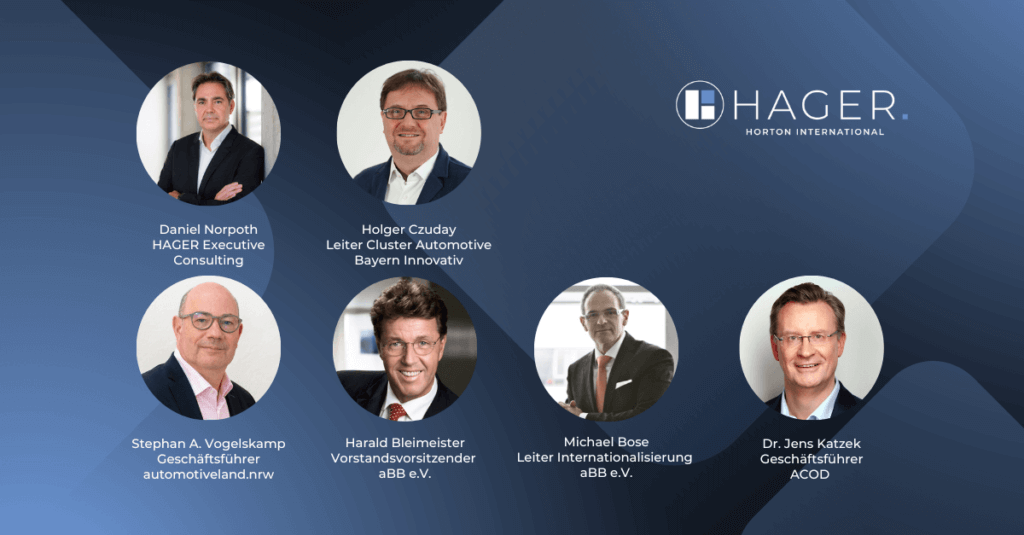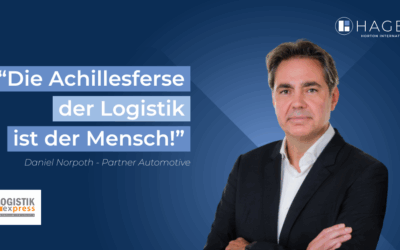AUTOMOTIVE SUPPLIERS UNDER POWER

The HAGER Business Unit Automotive & Mobility brought together renowned experts from the German automotive industry for the Top Voices panel discussion entitled “Transformation in the automotive industry”. Key topics were the resilience of automotive suppliers and the stagnating e-mobility. The most important assessments and forecasts.
The figures are alarming. According to a recent survey by the German Association of the Automotive Industry (VDA), 82% of medium-sized automotive companies are planning to postpone, relocate or completely cancel planned investments in Germany due to a lack of sales or sales expectations. More than one in three companies are waiting in the wings to relocate investments abroad. It is not only the intensifying international competition that is putting companies under pressure. EU trade policy, the shortage of skilled workers and labor, increased energy costs and, last but not least, bureaucracy at its limits are seen as negative factors. One ray of hope in terms of future viability is the fact that the potential of AI and machine learning is being recognized – 36% of companies in the VDA survey stated that they are already using these technologies, with a further 41% planning to do so in the foreseeable future.
QUO VADIS ELECTROMOBILITY?
The HAGER Top Voices panel discussion “Transformation in the automotive industry” used a panel of experts to explore the question that is currently preoccupying the predominantly medium-sized supplier companies (and car manufacturers) the most – what is the future of electromobility in Germany? Despite all assurances, the transformation process seems to be stuck in an international comparison. Suppliers and car manufacturers lack planning certainty in the face of contradictory signals from politicians. Some of the figures determined in the VDA survey result from this situation.
The experts invited by the HAGER Business Unit Automotive & Mobility, led by Business Unit Manager Daniel Norpoth, provided assessments and recommendations for action to improve growth prospects in the supplier industry. Among them were automotive association representatives from Berlin-Brandenburg. The capital city is now one of the “Champions League of European mobility regions”. Around 200 local companies from the automotive and supplier industry deliver components and parts directly to the assembly line.
THE ONLINE PANEL DISCUSSION WAS ATTENDED BY:
- Harald Bleimeister, Chairman of the Board of Automotive Berlin-Brandenburg (aBB e.V.) and Member of the Board of the Automotive Cluster East Germany (ACOD)
- Michael Bose, Head of Internationalization aBB e.V.
- Holger Czuday, Head of the Automotive Cluster at Bayern Innovativ (Bavarian Society for Innovation and Knowledge Transfer)
- Dr. Jens Katzek, Managing Director of ACOD and member of the 13-member expert group “Transformation of the Automotive Industry”, which was appointed by Federal Minister Dr. Robert Habeck.
- Stephan A. Vogelskamp, Managing Director of automotiveland.nrw and Managing Director of Bergische Struktur- und Wirtschaftsförderungsgesellschaft, Solingen
- Daniel Norpoth, Head of the HAGER Business Unit Manager Automotive & Mobility
- Max Krüger, Moderation (Bettertrust)
In their associations and clusters, the participants in the discussion are close to what concerns automotive suppliers. For example, aBB e.V. supports the practical concept development of technology solutions, develops strategic partnerships along the value chain and helps with pre-financing via funding programs. The automotiveland.nrw cluster management in turn works with its members to strengthen the automotive industry in North Rhine-Westphalia on the path to automated and electrified mobility.
The Automotive Cluster at Bayern Innovativ is an enabler and promoter of innovations and vehicle technologies, strengthens the Bavarian automotive and supplier industry with its activities and supports companies in the transformation process.
Suppliers are frustrated and unsettled, according to the expert panel. Following the end of the state bonus, sales figures for electric cars have fallen. At the same time, the demand for electric cars in China is increasing and with it the competition.
Dr. Jens Katzek, ACOD:
“Suppliers are receiving contradictory signals from politicians, which is naturally unsettling. For example, the environmental bonus for electric cars was canceled overnight, as was the important battery research.
The problem goes further, says Stephan A. Vogelskamp, automotiveland.rnw:
“We believe in electromobility and are making preparations. But who is responsible for the nationwide expansion of the charging infrastructure? There is no one in Germany who is strategically in charge of this. This must become a political agenda. The entire discussion about electromobility in the political sector is currently very negligent and naive.”
Holger Czuday, Bayern Innovativ, put it in a nutshell:
“Many people still don’t seem to want to admit that combustion engines will no longer be registered in 2035.”
There was a lack of state funding, explained Harald Bleimeister, aBB and ACOD :
“Today, entrepreneurs from the automotive industry stand before the bank like a traditional borrower. Co-financing from the federal government no longer exists. The pots are empty. This state backing must return if companies are to be multivalent in the future.”
Resilience is a hot topic in the German automotive industry. The participants agreed that the protagonists who will survive the global mobility transformation, which is shifting up a gear from year to year, are those who build up a healthy resilience to the transformation. However, companies are not the only ones with a duty here.
Dr. Jens Katzek:
“A stronger customer focus is crucial. It must become cheaper for consumers to buy e-cars than combustion engines. To achieve this, running costs must be reduced, for example in terms of vehicle tax. Charging electricity must also be treated better in terms of taxation. After all, diesel fuel has been given preferential treatment for decades.”
It is worth looking to China, says Michael Bose, Head of Internationalization at aBB:
“In 2014, China began to develop a concerted strategy in the field of electromobility. All partners, from administration to research and development through to the entire infrastructure, were brought together using sectoral technology and open to all sectors. This is cross-sector pragmatism and networked objectives. If you want to achieve technological leaps, a government has to take on this kind of responsibility in a leading role.”
Stephan A. Vogelskamp:
“Chinese manufacturers, most of whom are fully committed to electromobility, are the more promising target customers for the small and medium-sized enterprises (SMEs) in our environment. Chinese OEMs are of interest to our suppliers because they have clearer corporate strategies and much more tangible expansion budgets. Their clear export strategy to Europe is also convincing. I therefore see growth impetus being generated more by Asian OEMs.
He formulated critically:
“The transformation in Germany will not work if it is unstructured and as fragmented as it currently is. We need to start with large regional model projects, including the expansion of multimodal mobility services.”
But how to strengthen resilience or “self-healing powers”? The participants were almost unanimous in their support for a broader positioning of suppliers.
Harald Bleimeister:
“Suppliers should also look to gain a foothold in other industrial sectors, in short, they need to be more open to different industries, for example in the fields of medical technology or space technology. It is important to focus on your own technological expertise. You have to think more broadly.”
Holger Czuday encouraged:
“Don’t bury your head in the sand. The focus should be on the future. The culture of innovation both in research and in companies is one of Germany’s strengths as a business location. However, the market acceptance of e-cars is indeed essential.”
Daniel Norpoth, Head of the HAGER Business Unit Manager Automotive & Mobility, and moderator Max Krüger thanked the participants for the objective and informative discussion.
Learn more about: Daniel Norpoth



